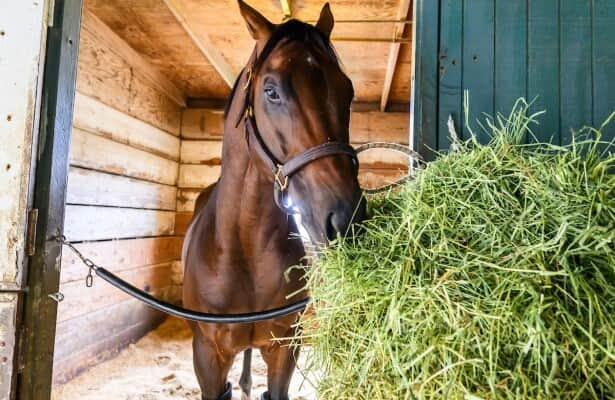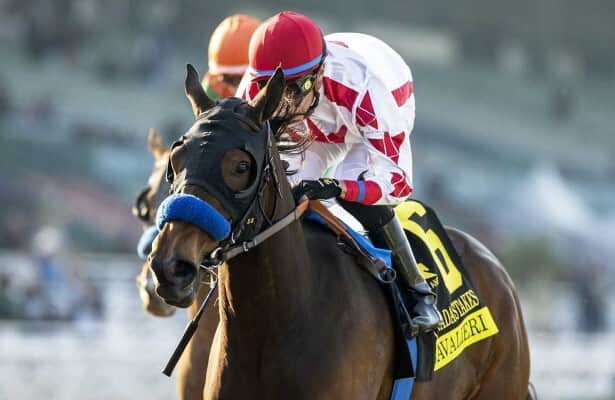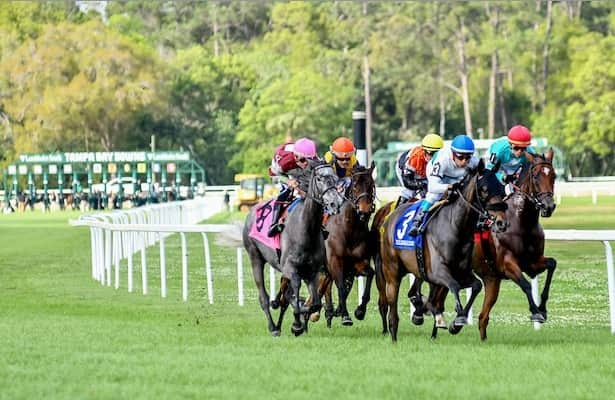California Crown: Fincher has warning about Señor Buscador

One thing about Todd Fincher and his scouting report on
Señor Buscador in Saturday’s inaugural California Crown. Either he is refreshingly
honest, or he is making like a football coach pumping up his opponents.
“This is definitely not the set-up we’re looking for,
because (Bob) Baffert is going to control the pace of the race completely, and
it’s not going to be a hot one,” Fincher said. “If it is, a jockey is going to
get fired.”
One trainer talking about another. Fincher was driving out
of Albuquerque, N.M., on Thursday morning, making the four-hour trek back to
his base in El Paso, Texas, to check on some young horses before flying west to
catch up with Señor Buscador.
Fincher did not paint a sunny picture of going against Muth
and National Treasure, two of the three Baffert entrants and the ones who seem
most likely to lead early in Saturday’s Grade 1, $1 million race. Maybe at the end,
too.
“They’re going to be having instructions not to hook up with
each other,” Fincher said on Horse Racing Nation’s Ron Flatter Racing
Pod. “It’s not going to be a fast pace. This is definitely not going to be a
good set-up for us.”
Not for a deep closer like Señor Buscador, who notably raced
in 12th before jockey Júnior Alvarado pushed the button six months ago at the
$20 million Saudi Cup (G1). Mostly ignored in the TV coverage and by bettors
who drifted his odds to 13-1, the 6-year-old son of Mineshaft was about to show
why he loved waiting for early speed to melt down.
Still fifth with a sixteenth of a mile to go, Señor Buscador’s
middle-of-the-track charge was unrelenting. The difference at the finish line
was the head by which the Kentucky-bred invader from New Mexico beat Ushba
Tesoro, more ballyhooed from Japan and more supported at 6-1.
The difference in purse money was staggering. Call it life
changing. Señor Buscador’s connections collected $10 million. Ushba Tesoro’s
settled for $3.5 million.
Connections have been complicated. The web got tangled after
Señor Buscador finished second by only a neck to National Treasure in the
January running of the Pegasus World Cup Invitational (G1) at Gulfstream Park.
The Peacock family led by Joey Peacock Jr. sold an unspecified share of the
horse to Middle East businessman Sharif Mohammed S Al Hariri. Leased, really. That
was the word bandied about in the international media.
That partnership allowed Al Hariri to use his stable colors on
Señor Buscador, but it lasted only through the 1 1/8-mile Saudi Cup and a
third-place finish worth $1.2 million in the March renewal of the 1 1/4-mile Dubai
World Cup (G1). It was designed to be nothing more or less than that.
Through all that international paperwork flying 8,000 miles through
the digital transom between Peacock in San Antonio and Al Hariri in Saudi
Arabia, Fincher remained a steady presence. He was rewarded in kind.
His previous biggest earner Flying Connection needed 17 starts
and three in-the-money finishes in Grade 1 stakes to cobble together $993,300
in purse earnings. In less than two minutes, Señor Buscador earned more than 10
times that much in faraway Riyadh. Fincher himself got $1 million just on his regular
percentage, although that, too, was complicated. It started with the owners’
share. And their generosity.
“They got $7 million,” Fincher said. “Ten percent went to
the jockey. Ten percent went to the trainer, and they gave me an extra 10
percent to hand out to my barn, my stable. That was a big burden on my
shoulders. You would think that would be so nice to hand out all that money to
your workers, but it caused a lot of problems.”
Just like a championship baseball team trying to figure out
how to divide World Series money. Instead of traveling secretaries, clubhouse
attendants and batboys, Fincher had assistants, grooms and hot walkers.
“It was very nice that those hard-working people who
probably worked a barn anywhere from 10 to 40 years got a big bonus,” he said.
Señor Buscador has more than made good on the Hancock family’s
monetary investment in a horse who was aimed first for the 2021 Kentucky Derby
before a suspensory injury sidelined him that spring. He has been reliably
durable since.
After coming home to New Mexico from the Middle East trip, he
was turned out before returning last month to finish fourth with his new jockey
Joe Talamo in the Pat O’Brien Stakes (G2) at Del Mar. At seven furlongs, the
race was not the route of ground Señor Buscador craves.
The 1 1/8 miles of the California Crown will be more like it,
but Fincher said the big goal has been and continues to be the 1 1/4 miles
beckoning at Del Mar. Not only is a $7 million carrot dangling in five weeks,
so is what Fincher hopes will be a very different speed set-up.
“We’re really looking forward to the Breeders’ Cup Classic,
where there should be a hot pace,” he said.
Visions of improving on last year’s seventh-place finish in
the Classic will dance in Fincher’s head. For now, though, he is focused on
this weekend at Santa Anita, where he continued to downplay Señor Buscador’s
chances of rallying past fading horses in the sun-splashed homestretch.
“This kind of small field with one guy having half the field
in it, they’re not going to go fast,” Fincher said. “They’re not going to go
fast for us. It’s going to take a huge, miraculous effort from him I believe to
win it. I know he’s as good as those horses, but I just don’t like the set-up
this time.”
With the Breeders’ Cup being the pot at the end of this winding
rainbow, the nine furlongs awaiting Señor Buscador with Talamo riding again still
will be useful.
“I do like that we’re going to get the mile-and-an-eighth in
him and be dead-set ready for the Breeders’ Cup,” Fincher said.
Whether the perception is that Fincher, 54, is being straightforward
or sandbagging will be left to bettors. That very dilemma only adds to what has
been a colorful story that goes back to the COVID year 2020. That was when Señor
Buscador, a debut winner, made his second start and won the Springboard
Remington Mile.
That dreary Friday night the week before Christmas in
Oklahoma, Fincher knew he had something special.
“He was aided with young horses running a mile for the first
time with a hot pace,” he said this week. “To his credit, too, it was only his
second race with one 5 1/2-furlong race under his belt. He’s impressive. He’s
been impressive every time. He’s run against the best horses from early on.
Once he got sound, I’ve always thought that he could run with the best. That’s
rarefied air, but I always thought he was that good.”
With a record of 20: 7-2-3 and that gargantuan total of
$12,711,427 in earnings, the end of Señor Buscador’s racing days are getting
close. He would not race at age 7, would he?
“I don’t think so,” Fincher said, “unless it’s the Pegasus.
The Pegasus is still a possibility. I don’t know. Possibly the Saudi. I don’t
know. We haven’t really discussed anything past the Breeders’ Cup. The Pegasus
runs in January. It’s about three weeks before breeding season. That’s
completely up to the owner at this point.”
Related
Leading Parx jockey Sanchez will serve 7-day suspension
Photo: Jason Moran / Eclipse Sportswire Jockey Mychel Sanchez will serve a seven-day suspension and pay an additional $1,750 in fines
Bill Mott talks about plans for Sovereignty, Just F Y…
Photo: Gulfstream Park / Lauren King Sovereignty, dramatic late-running winner of the Fountain of Youth (G2) March 1, is being pointed
Up-and-coming Cavalieri chases Grade 1 glory in Beholder Mile
Photo: Santa Anita / Benoit Photo Cavalieri and Alpha Bella, who finished one-two in the Grade 3 La Cañada in January at Santa Anita,
4 stakes showcase shipping stars on Tampa Bay undercard
Photo: Gonzalo Anteliz Jr. / Eclipse Sportswire The stars will shine Saturday at Tampa Bay Downs, and not just in the Grade 3 Tampa Ba











